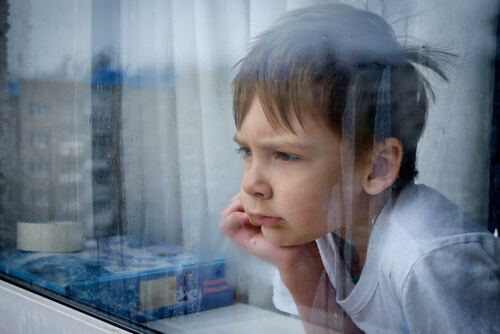Why Is My Child Tired All The Time?

You may be asking yourself, “Why is my child tired all the time?” There are various factors that can cause children to feel tired. In this article, we’ll tell you more.
6 Reasons Your Child Is Tired All The Time
Pay close attention to your children’s behavior and the circumstances they find themselves in each day. This is the best way to find out what is causing them to be tired all the time.
Call For Attention
Some children can get tired of any activity very quickly because what they really want to do is spend quality time with their parents. They may even show annoyance when their parents can’t play or spend time with them.
Having Lots of Toys
When children have too many things to play with, they won’t enjoy anything. This happens because they have nothing to focus their attention on. As a result, the frustration of having so many things to choose from makes them feel tired.
Emotional Problems
Your children can get physically tired if they’re angry or upset for a long time. It’s important to try and address their emotional state and make sure they’re okay so that they can continue with their daily activities.
Overstimulation
If you’re asking yourself “Why is my child tired all the time?” then you might discover they’re overstimulated. This prevents them from concentrating. It’s completely normal that this should make them feel tired.
Difficulty Sleeping
Obviously, your children might be tired all the time because they’re struggling to sleep well, either because they’re afraid, have nightmares, or general anxiety.
General Growth and Development
From 4 years old, children begin school and start learning new skills and taking part in group activities. All of this could make your children feel more tired.
Medical Conditions That Cause Tiredness
Childhood fatigue could be caused by a range of illnesses. Some of these include cardiac or renal problems, anemia, viral infections, poor diet, immune system problems, or the Epstein-Barr virus.

How to Address Childhood Fatigue?
The following advice will help reduce your children’s fatigue:
A Healthy Diet
It’s important for your children to get a range of different foods. Above all, they need to get iron and vitamin C, which are good for fatigue. You can find these in meats, fish, green leafy vegetables, dairy products, and fruit.
“It’s important to try and address their emotional state and make sure they’re okay so that they can continue with their daily activities.”
Getting Enough Sleep
It’s really important that they have good sleeping habits, particularly if they’re school age. Going to bed late isn’t good for them. Ideally, they need to get between 8 and 10 hours of sleep a night.
Mental Stimulation During Play
Instructive and recreational games are ideal for keeping your children’s minds awake and positive. You need to maintain a balance with these activities since too much stimulation could make them tired.
Constant Physical Exercise
Regularly practicing sports helps fight fatigue and stimulates the body. It’ll also help them sleep better at night.
Medical Attention
If you notice that your children are tired all the time but you can’t work out why, it’s probably a good idea to see a doctor. It could be the symptom of an illness.
Why Is My Teenager Tired All The Time?
Generally, the problem for youngsters is a change in their school hours. They also have greater responsibilities and more social activities. Add to all this all the biological changes that teenagers go through.
During this period, they may well have their sleep disrupted by apnea, circadian rhythm disorders, or insomnia. Another change is that teenagers often need to sleep late and get up late, which interferes with their responsibilities.

Symptoms of Fatigue in Teenagers
The main symptoms of fatigue tend to be frequent and sudden mood swings. They get angry easily, speak less, smile less, and become apathetic.
How to Help a Tired Teenager
If your teenagers are tired all the time, you can help them by providing them with your support, making sure they rest and sleep enough, and getting them medical attention if they need it.
Make sure they’re doing relaxing activities, such as talking, reading, listening to music, particularly just before they go to bed. It’s also important to have a good diet which provides enough vitamins and minerals for their healthy development.
In conclusion, the best thing is to make sure your children have everything they need. With these tips, you’ll soon stop complaining that your children are tired all the time.
You may be asking yourself, “Why is my child tired all the time?” There are various factors that can cause children to feel tired. In this article, we’ll tell you more.
6 Reasons Your Child Is Tired All The Time
Pay close attention to your children’s behavior and the circumstances they find themselves in each day. This is the best way to find out what is causing them to be tired all the time.
Call For Attention
Some children can get tired of any activity very quickly because what they really want to do is spend quality time with their parents. They may even show annoyance when their parents can’t play or spend time with them.
Having Lots of Toys
When children have too many things to play with, they won’t enjoy anything. This happens because they have nothing to focus their attention on. As a result, the frustration of having so many things to choose from makes them feel tired.
Emotional Problems
Your children can get physically tired if they’re angry or upset for a long time. It’s important to try and address their emotional state and make sure they’re okay so that they can continue with their daily activities.
Overstimulation
If you’re asking yourself “Why is my child tired all the time?” then you might discover they’re overstimulated. This prevents them from concentrating. It’s completely normal that this should make them feel tired.
Difficulty Sleeping
Obviously, your children might be tired all the time because they’re struggling to sleep well, either because they’re afraid, have nightmares, or general anxiety.
General Growth and Development
From 4 years old, children begin school and start learning new skills and taking part in group activities. All of this could make your children feel more tired.
Medical Conditions That Cause Tiredness
Childhood fatigue could be caused by a range of illnesses. Some of these include cardiac or renal problems, anemia, viral infections, poor diet, immune system problems, or the Epstein-Barr virus.

How to Address Childhood Fatigue?
The following advice will help reduce your children’s fatigue:
A Healthy Diet
It’s important for your children to get a range of different foods. Above all, they need to get iron and vitamin C, which are good for fatigue. You can find these in meats, fish, green leafy vegetables, dairy products, and fruit.
“It’s important to try and address their emotional state and make sure they’re okay so that they can continue with their daily activities.”
Getting Enough Sleep
It’s really important that they have good sleeping habits, particularly if they’re school age. Going to bed late isn’t good for them. Ideally, they need to get between 8 and 10 hours of sleep a night.
Mental Stimulation During Play
Instructive and recreational games are ideal for keeping your children’s minds awake and positive. You need to maintain a balance with these activities since too much stimulation could make them tired.
Constant Physical Exercise
Regularly practicing sports helps fight fatigue and stimulates the body. It’ll also help them sleep better at night.
Medical Attention
If you notice that your children are tired all the time but you can’t work out why, it’s probably a good idea to see a doctor. It could be the symptom of an illness.
Why Is My Teenager Tired All The Time?
Generally, the problem for youngsters is a change in their school hours. They also have greater responsibilities and more social activities. Add to all this all the biological changes that teenagers go through.
During this period, they may well have their sleep disrupted by apnea, circadian rhythm disorders, or insomnia. Another change is that teenagers often need to sleep late and get up late, which interferes with their responsibilities.

Symptoms of Fatigue in Teenagers
The main symptoms of fatigue tend to be frequent and sudden mood swings. They get angry easily, speak less, smile less, and become apathetic.
How to Help a Tired Teenager
If your teenagers are tired all the time, you can help them by providing them with your support, making sure they rest and sleep enough, and getting them medical attention if they need it.
Make sure they’re doing relaxing activities, such as talking, reading, listening to music, particularly just before they go to bed. It’s also important to have a good diet which provides enough vitamins and minerals for their healthy development.
In conclusion, the best thing is to make sure your children have everything they need. With these tips, you’ll soon stop complaining that your children are tired all the time.
All cited sources were thoroughly reviewed by our team to ensure their quality, reliability, currency, and validity. The bibliography of this article was considered reliable and of academic or scientific accuracy.
- Crawley E. (2018). Pediatric chronic fatigue syndrome: current perspectives. Pediatric health, medicine and therapeutics, 9, 27–33. https://www.ncbi.nlm.nih.gov/pmc/articles/PMC5919160/
- De Nardi, L., Lanzetta, M. A., Ghirigato, E., Barbi, E., & Gortani, G. (2022). Approach to the child with fatigue: A focus for the general pediatrician. Frontiers in pediatrics, 10, 1044170. https://www.ncbi.nlm.nih.gov/pmc/articles/PMC9755349/
- Findlay S. M. (2008). The tired teen: A review of the assessment and management of the adolescent with sleepiness and fatigue. Paediatrics & child health, 13(1), 37–42. https://www.ncbi.nlm.nih.gov/pmc/articles/PMC2528817/
- Harvard Health Publishing. (2020). A tired child? What you should know. Consultado el 16 de febrero de 2023. https://www.health.harvard.edu/blog/a-tired-child-heres-what-to-think-about-2018041713672
- Nap-van der Vlist, M. M., Dalmeijer, G. W., Grootenhuis, M. A., van der Ent, K., van den Heuvel-Eibrink, M. M., Swart, J. F., van de Putte, E. M., & Nijhof, S. L. (2021). Fatigue among children with a chronic disease: a cross-sectional study. BMJ paediatrics open, 5(1), e000958. https://www.ncbi.nlm.nih.gov/pmc/articles/PMC7893660/
- COMITE NACIONAL DE HEMATOLOGIA, ONCOLOGIA Y MEDICINA TRANSFUSIONAL y COMITE NACIONAL DE NUTRICION de la SOCIEDAD ARGENTINA DE PEDIATRIA. Deficiencia de hierro y anemia ferropénica: Guía para su prevención, diagnóstico y tratamiento. Resumen ejecutivo. (2017) Arch. argent. pediatr, vol.115, n.4 [citado 2023-02-28], pp.406-408. Disponible en: <http://www.scielo.org.ar/scielo.php?script=sci_arttext&pid=S0325-00752017000400032&lng=es&nrm=iso>. ISSN 0325-0075.
This text is provided for informational purposes only and does not replace consultation with a professional. If in doubt, consult your specialist.








